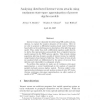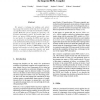178 search results - page 6 / 36 » Modelling Network Performance with a Spatial Stochastic Proc... |
PE
2010
Springer
13 years 1 months ago
2010
Springer
Performance prediction and measurement approaches for component-based software systems help software architects to evaluate their systems based on component performance specificat...
ENTCS
2007
13 years 6 months ago
2007
Queueing network formalisms are very good at describing the spatial movement of customers, but typically poor at describing how customers change as they move through the network. ...
ENTCS
2010
13 years 6 months ago
2010
Process modeling languages such as "Dynamical Grammars" are highly expressive in the processes they model using stochastic and deterministic dynamical systems, and can b...
JCSS
2008
13 years 6 months ago
2008
Internet worms are classically described using SIR models and simulations, to capture the massive dynamics of the system. Here we are able to generate a differential equation-base...
MASCOTS
2003
13 years 8 months ago
2003
We present a technique for defining and extracting passage-time densities from high-level stochastic process algebra models. Our high-level formalism is PEPA, a popular Markovian...


